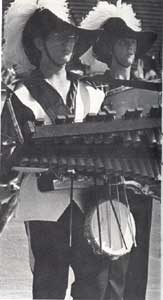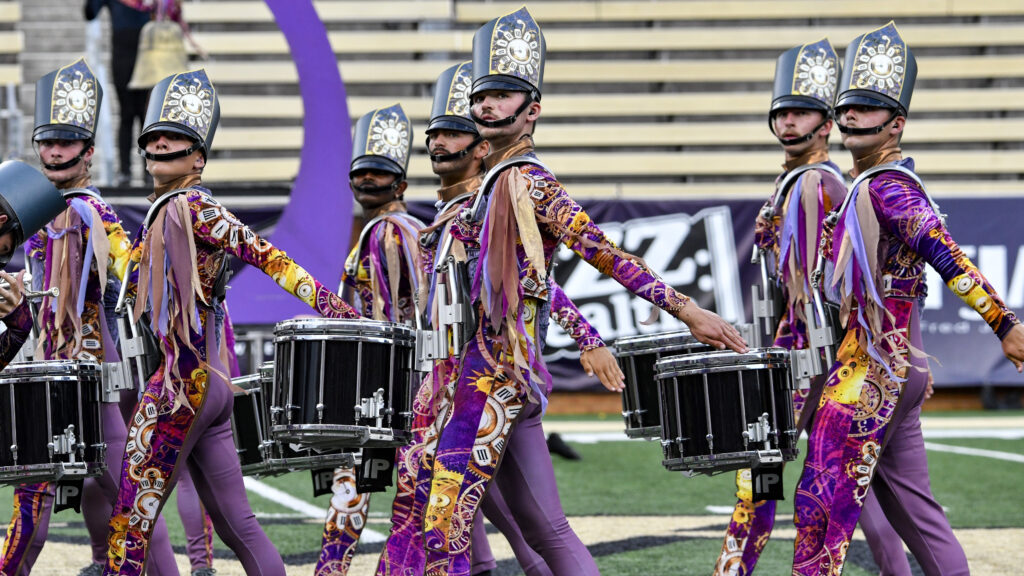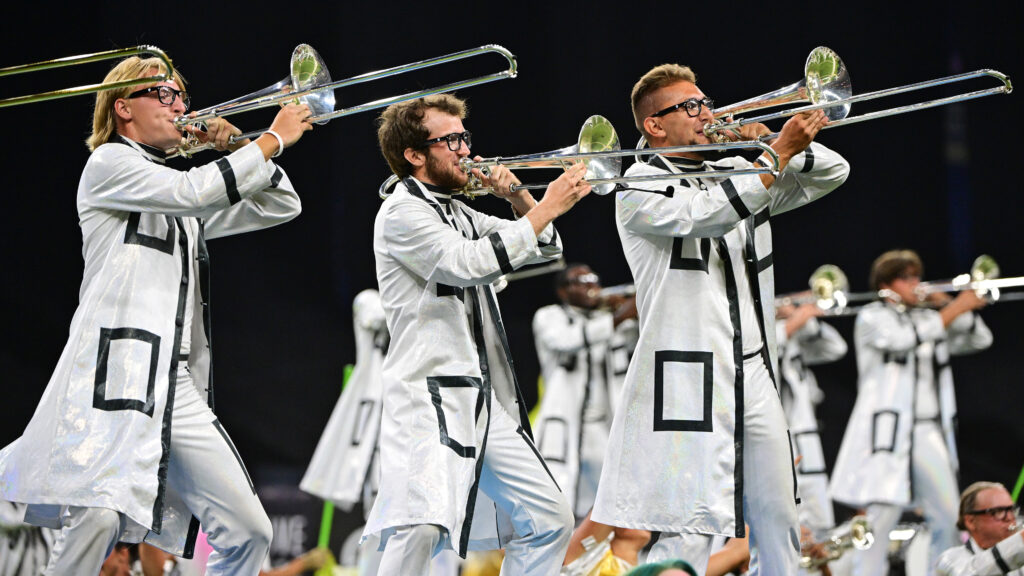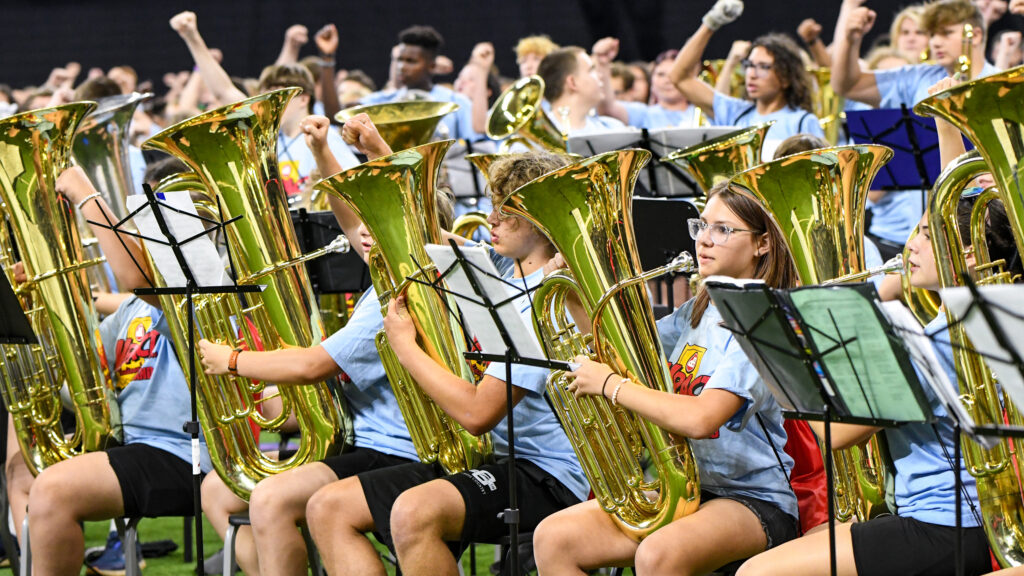
Perseverance takes many forms. There are multitudes of ways people overcome adversity. Those who have gone through drum corps learn to be resourceful when necessary and learn to put up with lots of potential hardships that they might not put up with outside of drum corps, just so they can fulfill their dream of marching, keep their promise to others, or keep the show “on the road.” The stories below differ in degree of adversity, but each captures an essence of what it takes to be in and thrive in drum corps. Brandon Tanner knows something about overcoming odds. “I’ve always wanted to march, ever since I learned about the activity in 1997. I was all set to go, too, but in my sophomore year of high school I got cancer and began a battle that would last five years, costing me most of my hair, and worst of all, most of my playing ability. “I lost the feeling in my legs and hands, I had to relearn how to walk, and I was sick all the time. It was a struggle to even graduate from high school on schedule. Marching was obviously put on the back burner. “I eventually recovered and I’m free and clear now. I’ve only got one year left, and as of last summer, my doctor finally said I was ready. I needed a corps home to give me a rook-out year to remember, and Capital Regiment has been more than happy to oblige. “That’s my story in short form. There’s more, but I don’t want to ramble.” Brandon: You’ve overcome cancer. You’re allowed to ramble. Good luck staying cancer-free. Steve Sorrell marched Spirit of Atlanta 1982-1985. “Spirit had a close bond with the Garfield Cadets from 1983 through 1985. We traveled a lot with them and became close friends. “In 1984, one of our food moms was hit by a car while crossing the street at the show in Sevierville, Tenn. It was a very emotional time for us, especially for her son who was in the snare line. The Cadets gave us comfort, keeping us in their prayers, and they gave us a card at the show the next night. It was such a small gesture, yet someone took time out of their busy day to remember our corps by leaving their corps rehearsals to go get a card. I know that it meant a lot to our membership and staff. “I think it was also in 1984 when the Cadets’ truck broke down on the way to the show in Toledo, Ohio. They borrowed all of Spirit’s guard and percussion equipment, and I think a majority of our horns. We sat in the front few rows of the stands — there was not a big crowd at all — and cheered wildly. “At a show in Macon, Georgia in 1984, my podium didn’t make it to the field for some reason, so in a hurry, I arranged for Tom from the Troopers to leave his on the field for me. The Troopers used scaffolding for their podium, and I was VERY uncomfortable and scared to death! Not only was it higher than I was accustomed to, it was quite wobbly as the ground was not quite level. I vowed never to do that again, although no fault of the F-Troop.” Sara Neumann responded to the column “Drum Corps Saved My Life” (Fanfare: February 13, 2004) . “In a way, drum corps saved my life, also. I always loved music in high school and in some ways that was the one thing that kept me enjoying high school. I actively sought out people who enjoyed the same and I was in heaven upon arriving at college and meeting tons of corps people. With their help, I marched Capital Sound in 2000 and 2001, and aged out with Colts in 2002. “While I wasn’t really saved, I was an anxious, relatively disliked kid. I never took risks, I worried much, and I was constantly nervous. In addition to my anxiety, I have a disorder called trichotillomania. While that is a huge word that seems foreign to many, 6 to 8 million Americans suffer from the same disorder; not knowing what it is or why it happens. It involves pulling hair from your body — I pulled my eyelashes and eyebrows. “My disorder was controlled every summer of drum corps, especially my last year with Colts when we were on tour full time. For the first time in years, I had a full set of eyelashes and eyebrows, and I did not have to constantly wear makeup to hide it all. I felt comfortable confiding my problem to several members of the guard (which makes it easier for me to tell my story here). They immediately seemed to understand and with my direction, were able to help me. I’m not sure this would have happened anywhere else. “The subculture we call ‘drum corps’ invites any and all people to belong. We embrace all with open arms, we give everyone a chance if they love what they do. Without this common acceptance, I may not have been able to tell others about my disorder and I may not have been able to conquer this impulse. “Now I am not marching and I am not in nearly as good of condition as I was. I wish I could go back and have another chance to fight my disorder, but I don’t. For that three months however, the feeling of success can never change, and I will always hold that memory close. For three summers, a family was there to support me and help me succeed not only off the field, but on the field as I overcame my disorder and my anxiety and learned to perform with confidence.” Sara: I know I speak for all drum corps members and fans when I say the following. We’re STILL with you. Carlos Johnson knows what it means to want to march. “I made Southwind’s tenor line at the last camp in 2002. Soon it was moving-in day and I was physically not ready for it. I was crushed and went home devastated, even after attempts to place me in the front ensemble. I tried but I was just too hard on myself. When I went home two weeks later, I got an e-mail from East Coast Jazz responding to an application I placed on marchdrumcorps.org . “Next thing you know, I was back in the game and I aged out with a Division II finalist medal. The medal means so much to me, because it represents a saying I’ve adopted and shared with my family, friends, and students: ‘Perseverance over Adversity.’ I learned a lot about my ability and myself, I made a lot of friends, and I got to travel and learn about the activity. “Sometimes we’re our own biggest enemy — sometimes things aren’t as bad as they seem. ‘Perseverance over Adversity’ can mean many things: It can mean proving to those who doubt you that you have talent and ability, but it can also mean proving to those who believed in and invested time and effort in you that you’re not going to let your fellow corps members down. As long as you are dedicated and push through, you’ll soon find yourself where you want to be.” Fanfare archives
Michael Boo has been involved with drum and bugle corps since 1975, when he marched his first of three seasons with the Cavaliers.
He has a bachelor’s degree in music education and a master’s degree in music theory and composition.
He has written about the drum corps activity for over a quarter century for publications such as Drum Corps World, and presently is involved in a variety of projects for Drum Corps International, including souvenir program books, CD liner notes, DCI Update and Web articles, and other endeavors. Michael currently writes music for a variety of idioms, is a church handbell and vocal choir director, an assistant director of a community band, and a licensed Realtor in the state of Indiana. His other writing projects are for numerous publications, and he has published an honors-winning book on the history of figure skating. His hobbies include TaeKwonDo and hiking the Indiana Dunes. But more than anything, Michael is proud to love drum corps and to be a part of the activity in some small way, chronicling various facets of each season for the enjoyment of others.





